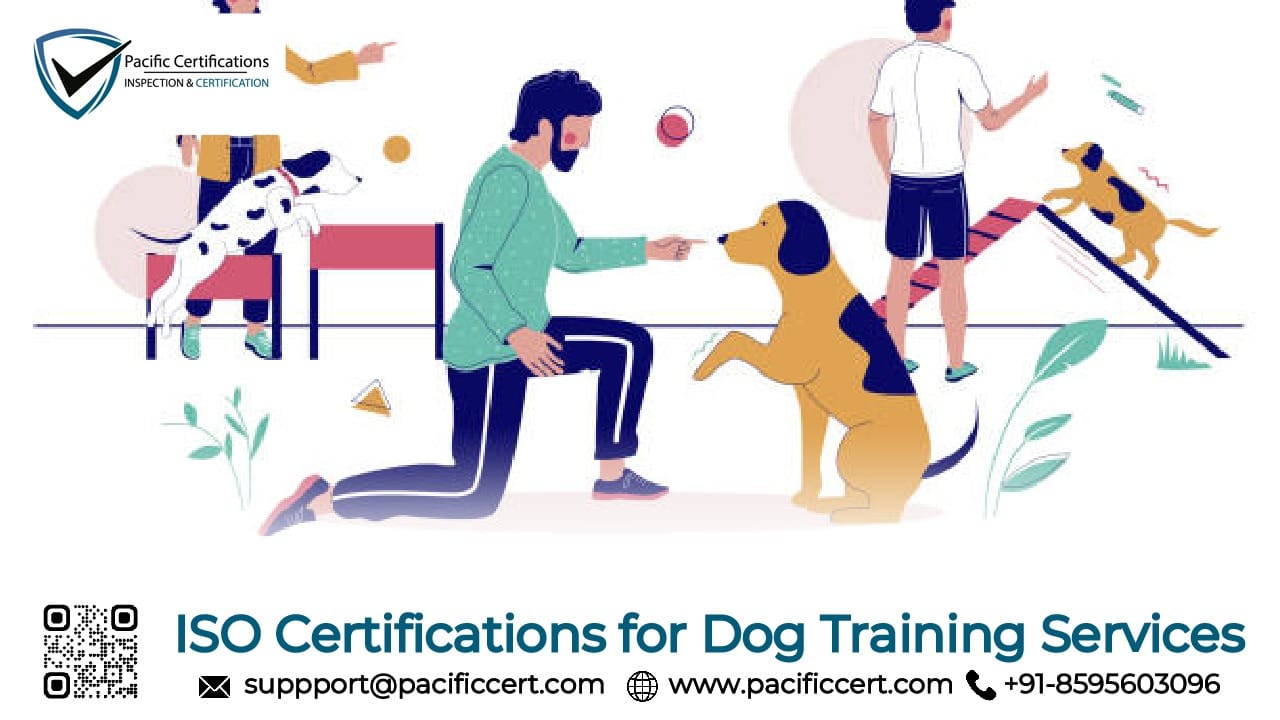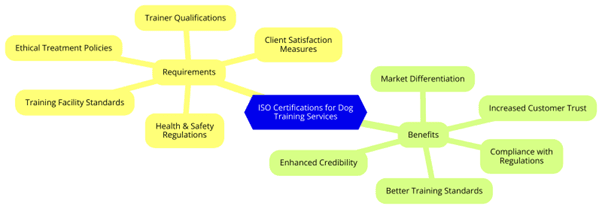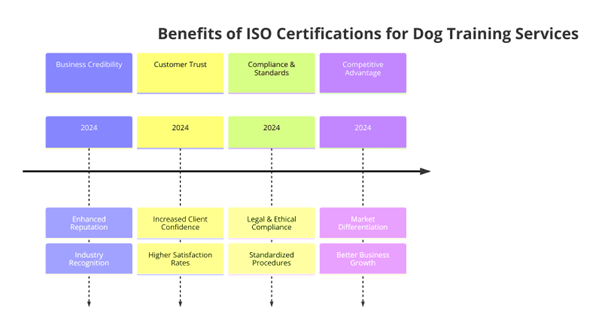ISO Certifications for Dog Training Services, Requirements and Benefits

Market Trends
Dog training services are embracing ISO certifications to highlight professionalism, safety, and service quality. ISO 9001 helps trainers follow structured methodologies and build client trust. ISO 29993:2017 ensures well-designed, learner-focused training programs. ISO 26000 promotes ethical, welfare-centered practices. ISO 45001:2018 supports safe working conditions when handling animals and clients. ISO 14001:2015 encourages eco-friendly facility management and waste disposal. Achieving certification involves preparing documented policies, conducting internal reviews, and undergoing formal audits. Benefits include enhanced credibility, improved operational consistency, safety-first practices, client confidence, and access to premium opportunities—especially vital as the pet services market grows rapidly.
ISO Standards for Dog Training Services
Dog training services have evolved significantly in the past decade, with an increasing demand for high-quality, ethical & professional training methods. Whether for obedience training, behavioural correction, service dog training or therapy dog certification, professional trainers and organizations must ensure they meet global standards.
This is where ISO certifications come into play. ISO establishes globally recognized standards to ensure safety, efficiency and effectiveness in various industries—including pet training and animal behaviour services.

By obtaining ISO certification for dog training services, businesses demonstrate their commitment to best practices and customer satisfaction. Let’s explore the applicable ISO standards, their requirements, and how they can benefit dog trainers and pet training centers!
Reach out to our experts at [email protected] for guidance on ISO audits & certification!
Applicable ISO Standards for Dog Training Services
Several ISO standards apply to dog training centers, animal welfare organizations, and canine service providers. Below are the most relevant certifications:
ISO 9001:2015 - Quality Management System (QMS)
This certification ensures that dog training facilities follow a systematic approach to delivering high-quality training services. It focuses on:
Customer satisfaction
Process improvement
Consistent service delivery
With ISO 9001, dog trainers can establish structured training methodologies, track improvements, and maintain client trust.
ISO 29993:2017 - Learning Services Outside Formal Education
ISO 29993 is a key standard for dog training institutions, as it applies to non-formal learning services, including professional training for pets. This standard ensures:
Structured lesson plans for different dog breeds and behavior types
A well-defined learning process
Qualified trainers and ethical training approaches
ISO 26000 - Social Responsibility
ISO 26000 is beneficial for dog training businesses aiming for ethical and socially responsible training practices. It ensures trainers follow:
Animal welfare guidelines
Ethical training practices that avoid harmful methods
Responsible engagement with pet owners and communities
ISO 45001:2018 - Occupational Health & Safety Management System (OHSMS)
Dog training involves physical activities, animal interactions, and client handling, which means there are potential health and safety risks. ISO 45001 ensures:
Safe working conditions for trainers
Risk management in dog behavior handling
Emergency protocols for aggressive or anxious dogs
ISO 14001:2015 - Environmental Management System (EMS)
Dog training services that operate large facilities or training centers can benefit from ISO 14001, which focuses on:
Eco-friendly training materials
Proper waste disposal from training grounds
Sustainable facility management
By implementing ISO 14001, dog training centers contribute to a cleaner environment while maintaining high-quality services.
Click here to find out more applicable standards to your industry
Contact us
At Pacific Certifications, we specialize in ISO audits and certification issuance for businesses, including dog training services. While we do not provide consulting, gap analysis, or training implementation, we help organizations achieve ISO compliance through certification audits.
Our Process:
Pre-Audit Assessment – Evaluating your current dog training policies against ISO standards.
ISO Audit – Conducting official certification audits for your training center, employees, and processes.
Certification Issuance – If compliance is met, we issue the ISO certification for your dog training service.
Surveillance Audits – Regular checks to ensure ongoing ISO compliance.
For professional ISO audits and certification, contact [email protected].
Requirements of ISO Certifications for Dog Training Services
Below are the key requirements of ISO certifications for dog training services, categorized by each relevant standard:

ISO 9001:2015 – Quality Management System (QMS)
Defined Quality Policy – Establish a clear commitment to quality training.
Standardized Training Methods – Use consistent and effective dog training techniques.
Customer Satisfaction – Collect feedback and improve training programs.
Record Keeping – Maintain training logs, customer records, and evaluation data.
Continuous Improvement – Implement periodic reviews to enhance service quality.
ISO 29993:2017 – Learning Services Outside Formal Education
Structured Training Plans – Develop detailed dog training programs with objectives.
Competent Trainers – Ensure qualified and skilled dog trainers.
Learner-Centered Approach – Customize training methods based on dog behavior.
Evaluation & Feedback – Assess training progress and adjust accordingly.
Transparent Communication – Provide clear training expectations to clients.
ISO 26000 – Social Responsibility
Animal Welfare Compliance – Avoid harsh training methods and ensure ethical treatment.
Trainer Ethics & Responsibility – Follow humane dog training principles.
Community Engagement – Educate pet owners about responsible dog training.
Sustainability Practices – Promote eco-friendly training tools and processes.
Fair Practices – Ensure transparent pricing and services for customers.
ISO 45001:2018 – Occupational Health & Safety (OHSMS)
Trainer Safety Protocols – Implement safety measures for handling aggressive dogs.
Emergency Procedures – Have plans for dog bites, escapes, or unexpected behaviors.
Workplace Risk Assessment – Identify and mitigate physical hazards in training areas.
First Aid & Medical Support – Ensure availability of first-aid kits and medical assistance.
Trainer Well-being – Maintain stress management programs for trainers.
ISO 14001:2015 – Environmental Management System (EMS)
Eco-Friendly Training Materials – Use biodegradable training aids.
Waste Management – Proper disposal of dog waste and cleaning chemicals.
Energy Efficiency – Optimize facility lighting, heating, and water use.
Environmental Awareness – Train staff and customers on sustainable pet care.
Compliance with Local Laws – Follow regulations for animal care & environmental safety.
Each ISO certification has its specific requirements, helping dog training businesses improve service quality, safety, and customer satisfaction. For an audit and certification, contact [email protected] today!
Benefits of ISO Certifications for Dog Training Services
Obtaining ISO certification offers numerous benefits to dog training facilities and pet service providers:

Credibility and Trust
ISO certification demonstrates professionalism and assures clients that their dogs are in safe hands.
Training Quality
Standardized training methodologies ensure that every pet receives the same level of care and instruction.
Business Opportunities
ISO-certified dog training services can access government contracts, corporate pet training programs, and premium clientele.
Compliance
Following ISO 26000 ensures that training methods are ethical and humane, avoiding outdated, harmful practices.
Safety
ISO 45001 compliance helps in preventing injuries to trainers, pet owners, and dogs.
Competitive Advantage
With ISO certification, a dog training business can stand out in the growing pet services industry, attracting more clients.
The global pet services industry is expected to reach $40 billion by 2030, with a significant rise in demand for certified dog training programs.
Key Trends in Dog Training
AI-powered training apps for pet owners
Virtual dog training classes for busy professionals
Positive reinforcement methods replacing traditional dominance-based training
Eco-friendly training materials aligned with ISO 14001
Recent Trends
With this growth, ISO-certified dog trainers will be in high demand, ensuring their services meet global quality standards. Start your ISO certification journey now and establish yourself as a leader in professional dog training services!
Pacific Certifications is accredited by ABIS, in case you need support with ISO certification for your Dog Training Services business, please contact us at [email protected] or +91-8595603096.
Ready to get ISO certified?
Contact Pacific Certifications to begin your certification journey today!
Suggested Certifications –
Read more: Pacific Blogs

